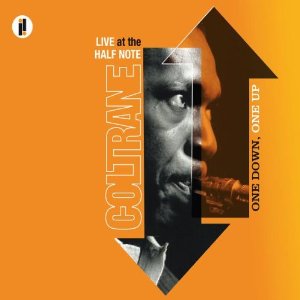John Coltrane - One Down, One Up: Live At The Half Note (1965)
jazz | 2cd | eac-flac-cue-log-cover | 645MB
Impulse!
Allmusic:
2005 was a watershed year for unreleased music by John Coltrane. First there was the unbelievable Thelonious Monk with John Coltrane Live at Carnegie Hall. Now Impulse offers this double CD of radio broadcasts in One Down, One Up: Live at the Half Note. It was recorded in March and May of 1965 by DJ Alan Grant for radio broadcast; while recording for broadcast, many hosts would usually just drop in on a session and tape the band for under an hour and take no note of catching a performance from the beginning. That rule applies here. The first disc was recorded on March 26. Grant's introduction begins during Jimmy Garrison's solo. The band had already been playing the title cut for 35 minutes. Coltrane steps in a couple of minutes in and blows hard for nearly 28 minutes. Trane had already released A Love Supreme and was seeking to expand the harmonic reaches of his sound, exploring every avenue available to him. The band astonishes too. Here McCoy Tyner, Garrison, and Elvin Jones push the limit, swinging hard and fast (Jones' playing is especially outrageous). Tyner's big block chords play toward ascending Coltrane's scales, not trying to keep up but expanding the chromatic palette with a fury. He drops out around the ten-minute mark and it's Trane and Jones forcing each other into unknown corners before breaking out of them into new dimensions. Garrison's attack is not content to try to keep it grounded but provide enough of an anchor for the intervallic exploration to be limitless. Garrison drops out as well and it's a duet near the end of the track, Jones matching Coltrane measure for measure with a breathless intensity before Tyner and Garrison reenter to take it out with the modal head coming back in a completely different form. What's remarkable is that Trane avoided his sheets-of-sound approach entirely here. His solo is focused and the restraint is harmonic, but it results in a performance of expansive force and muscular taste. And it nearly is. Despite a few near washouts in the sound, Trane's capability to continue to build a solo is simply astonishing. After a minute of announcements, the band kicks into "Afro Blue." This cut, a mere 12 minutes, is a tour de force for the band (Tyner's solo in particular).
Disc two, from May 7, thankfully, begins at the beginning, so to speak. The band is introduced before they start paying "Songs of Praise," an abstract workout more dissonant than the earlier show. But here again, the band locks into Coltrane's solo from the jump. Here it's Tyner shining a light from the stand. His ascending and descending chords offer large foundations for Trane to lift off from. Jones' accents after nearly every phrase propel Garrison and Coltrane to step out and move their own scalar investigations to more complex territory. The final track, "My Favorite Things," is nearly 23 minutes here. Coltrane uniquely uses the tenor to introduce the tune before switching to the soprano. Tyner uses a skeletal frame on the theme and it goes off almost immediately with Coltrane soloing all around the melody. He returns often enough for the tune to keep its body, but his Eastern modal progressions go far afield. Tyner's solo is a flurry of assonance and dissonance with his right hand. Unfortunately, just as another mode asserts itself, Grant fades the band out, just as they hit the stratosphere. Unfortunate, yes, but it takes nothing away from the absolute necessity of this set for Coltrane fans. The sound is wonderful -- except in the dropout patches that last no more than a second or two. This is a release of historic importance and one that, now that it's off the bootleg market, will be talked about by jazz fans and Coltrane aficionados for the foreseeable future.
Tracks
Disc 1
-1. "Introduction and Announcements" – 1:36
-2. "One Down, One Up" – 27:39
-3. "Announcement" – 0:51
-4. "Afro-Blue" – 12:44
Disc 2
-1. "Introduction and Announcements" – 0:43
-2. "Song of Praise" – 19:38
-3. "Announcements" – 0:43
-4. "My Favorite Things" – 22:37
Personnel
* John Coltrane – tenor saxophone/soprano saxophone
* Jimmy Garrison – double bass
* Elvin Jones – drums
* McCoy Tyner – piano



















